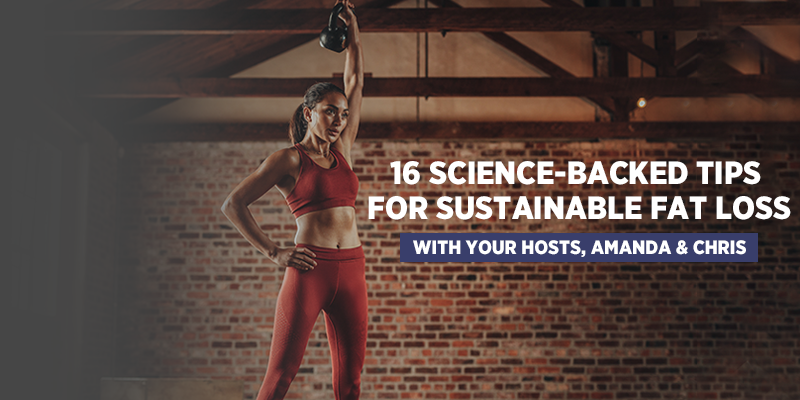
Episode 30: 16 Science-Backed Tips for Sustainable Fat Loss
Show Notes
In this episode you’ll learn:
- Healthy ways to measure your success when it comes to fat loss
- About why eating in a moderate calorie deficit is crucial for fat loss
- Why you don’t want to eat too low calorie
- That basal metabolic rate and total daily energy expenditure are important if you’re tracking macros and calories
- What basal metabolic rate means
- Why tracking calories and macros is helpful for long-term weight loss
- Start tracking everything that makes you feel good, bad, etc.
- About portion control and its role in fat loss
- Why eating less refined foods and more whole foods is critical to healthy weight loss
- About the 80/20 rule and how it can be helpful
- Why eating fat doesn’t make you fat
- Why a “sad” salad is not nearly as effective as a more filling salad
- Some healthy fats to incorporate into your routine
- That it’s critical to eat plenty of protein, produce, and fiber throughout the day
- Why it’s better to eat fruit after your workout and veggies at all times of the day
- Why a nutrition plan is so much more effective than a short-term, restrictive diet plan
- About obesogenic environments and why they can make it more difficult to maintain a healthy weight
- Tips for how to overcome an obesogenic environment
- About compensatory physiological adaptations and how they affect your hunger levels
- Why it’s critical to properly adjust your calorie levels as you lose weight
- The difference between tracking body composition and tracking weight
- That chewing your food is crucial for breaking down your food and healthy digestion
- What nutrient timing is and how it can help optimize weight loss
- That stress can play a huge role in multiple aspects of your health
- Tips for maintaining healthy insulin levels
- That maintaining hormone levels is imperative to healthy fat loss
- What xenoestrogens are and how they can affect hormone levels and weight
- Ways to avoid leptin sensitivity
- About hunger hormones like ghrelin and neuropeptide Y and ways to optimize them
- Why sugary drinks like fruit juices are not helpful for weight loss
- About intermittent fasting to help with fat loss
- Ways to address and optimize gut health
- That the supplement glutamine can be helpful
- Why choosing smaller plates and silverware can be helpful with portion control
- That sprinting is extremely effective for fat loss
References:
If you need help with calculating macros/calories, contact Chris here: Chris Rocchio on Instagram |masteryourhealth.net
Master Your Health Episode:
Things Preventing You From Reaching Your Goals (Stress)
How to Set the Stage for Better Sleep
Products:
Sources:
“Diets w/ a lot of ultra-processed-foods caused excess calorie intake which in turn led to weight gain unlike the unprocessed food diet.” https://osf.io/preprints/nutrixiv/w3zh2
Feb 2019 study published in the journal of the American medical association linked an increase in consumption of ultra processed foods w with a higher risk of all-cause mortality. https://jamanetwork.com/journals/jamainternalmedicine/article-abstract/2723626
“Dieting: proxy or cause of future weight gain?” 2015 https://www.ncbi.nlm.nih.gov/pubmed/25614200
“Dieting and restrained eating as prospective predictors of weight gain” 2013 https://www.ncbi.nlm.nih.gov/pmc/articles/PMC3759019/
“Physiological adaptations to weight loss and factors favouring weight regain” 2015 https://www.nature.com/articles/ijo201559
“Weight loss, weight maintenance, and adaptive thermogenesis” 2013 https://academic.oup.com/ajcn/article/97/5/990/4577235
“Effect of physical activity on weight loss, energy expenditure, and energy intake during diet induced weight loss.” 2014 https://www.ncbi.nlm.nih.gov/pubmed/23804562
“Eating slowly led to decreases in energy intake within meals in healthy women.” https://www.ncbi.nlm.nih.gov/pubmed/18589027
“Eating slowly increases the postprandial response of the anorexigenic gut hormones, peptide YY and glucagon-like peptide-1.” 21010 https://www.ncbi.nlm.nih.gov/pubmed/19875483
“Increased chewing reduces energy intake, but not postprandial glucose and insulin, in healthy weight and overweight young adults.” 2019 https://www.ncbi.nlm.nih.gov/pubmed/29767425
“Eating attentively: a systematic review and meta-analysis of the effect of food intake memory and awareness on eating” 2013 https://academic.oup.com/ajcn/article/97/4/728/4577025
“The effect of protein timing on muscle strength and hypertrophy: a meta-analysis.” 2013 https://www.ncbi.nlm.nih.gov/pubmed/24299050
“Pre- versus post-exercise protein intake has similar effects on muscular adaptations” 2017 https://www.ncbi.nlm.nih.gov/pmc/articles/PMC5214805/
“International society of sports nutrition position stand: nutrient timing” 2017 https://jissn.biomedcentral.com/articles/10.1186/s12970-017-0189-4
One study found leptin levels in obese patients were 4x higher than those at normal weight https://www.ncbi.nlm.nih.gov/pubmed/8532024/
Glutamine has been shown to be a promising therapeutic approach to stimulating insulin secretion in obesity and type 2 diabetes patients. https://www.ncbi.nlm.nih.gov/pubmed/19056578
Glutamine can reduce Firmicutes by balancing out the ratio between them and another class of bacteria, Bacteroidetes, which in turn can also decrease the amount of ghrelin and leptin-mimicking secretions that come from this class of bacteria. https://www.ncbi.nlm.nih.gov/pubmed/2593349
- Connect with with Amanda here: @MeowMeix | MeowMeix.com

Recent Comments